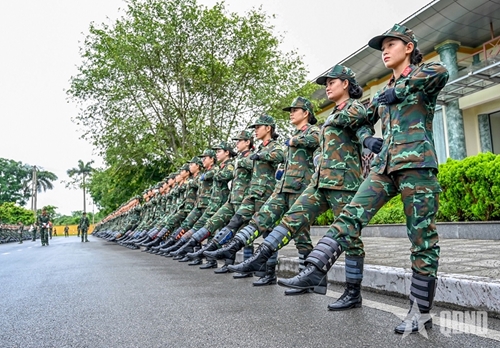Nearly 200 members gathered in Hanoi on June 6 and immediately began training for the event. Although most had previously participated in the parade marking the 50th anniversary of Southern Liberation and National Reunification (Mission A50), the climatic differences between North and South Vietnam have posed significant challenges. The combination of searing heat, high humidity, and sudden downpours has tested both their physical endurance and mental resilience.
Yet, in the face of hardship, the women remain committed and resilient. Non-commissioned First Lieutenant Nguyen Thi Cam Hoa, from Military Region 9, shared: “In the first few days, we weren’t used to the intensity of the training or the weather. Many comrades had headaches, sore muscles, and blistered feet. But everyone pushed through, knowing that missing even one training session could disrupt the whole formation and set us behind.”
    |
 |
|
Members of the female special force formation in training |
The training regimen mirrors that of Mission A50. Each soldier begins with ankle weights, 0.5kg per leg, increasing to 1kg, to build strength and stability while practicing foot positioning, weapon handling, and head movements in 30- to 40-second intervals. As training progresses, they wear full gear: a 2.6kg combat helmet, a 3.5kg STV-215 rifle, protective armor, gloves, and boots, collectively adding over 1kg. The duration of drills increases from one to up to three minutes. Marching drills, in particular, demand heightened precision and stamina.
Because the drills require uniformity and accuracy down to the centimeter, prolonged exposure to the sun leaves many exhausted. Reflecting on the physical toll, Corporal Nguyen Thi Thu Thuy from Military Region 7 said, “Wearing the gear helps us improve balance, endurance, and footwork precision, but it also causes muscle strain and cramps. In the heat, we sweat heavily and lose a lot of fluids. From our A50 experience, we’ve learned to massage each other with ice water and stay hydrated with water, vitamins, and lots of fruit.”
According to Major Vu Cong Trung of the Military School under Military Region 7, who oversees the training, the program is structured with gradually increasing intensity. “We adjust the schedule to avoid peak heat, with morning drills from 6:30 to 10:00 and afternoon sessions from 3:00 to 5:30. Nutritional support and electrolyte supplements are also provided. In addition, we organize cultural and recreational activities during breaks to boost morale and ensure consistent performance,” he said.
Beyond the physical demands, many female soldiers also struggle with homesickness. Still, they remain focused and determined. Corporal Nguyen Thi Thu Thuy, one of the youngest members, added, “Many of our comrades are married with small children. Despite the challenges, we support and encourage each other, always ready to help when needed.”
Non-commissioned Major Truong Thi Yen Ngoc, from the Tien Giang (now Dong Thap) Provincial Military Command, is a shining example of perseverance. A mother of two, she has overcome numerous obstacles to fulfill her duties with distinction. According to Colonel Trinh Van Khue, Deputy Political Commissar of the Military School of Military Region 7 and Political Officer of the female special forces unit, Ngoc’s husband is also a soldier, currently serving with Regiment 924 under the Tien Giang Command, about 60km from their home. “While she is on duty in the North, their two children are being taken to school by neighbors. We have proposed transferring her husband to a unit closer to home so she can focus on her mission,” Col. Khue said.
In the evenings, after daily routines, Maj. Ngoc spends a few precious minutes calling her children. “Even just a few minutes of hearing my child ask what I ate today or whether I’m tired warms my heart,” she shared.
Many others face similar challenges. Second Lieutenant Vo Thi Tuong Vi from the Staff Department of Military Region 5 is a mother of three, yet she volunteered for the parade. At times, she misses her children to tears, but with encouragement from her superiors and support from teammates, she has kept pace with the formation and excelled in every training session.
During breaks and after drills, the female soldiers massage each other’s legs, soak their feet, bandage blisters, and laugh together. These small gestures build a deep sense of solidarity and determination to overcome every obstacle, and complete their training for the parade with excellence.
Translated by Tran Hoai